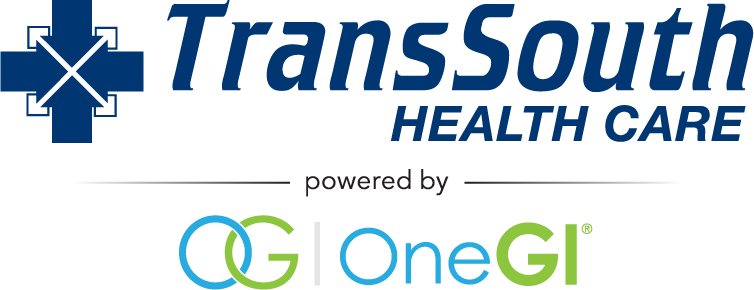Achalasia
Barrett’s Esophagus
Celiac Disease
Chronic Constipation
Chronic Diarrhea
Cirrhosis
Clostridium Difficile Infection
Colon Polyps
We Are
Digestive Health
Patients First
Our entire staff is committed to providing the highest quality of medical care for a wide range of disorders of the digestive system - the esophagus, stomach, intestines, colon, liver and pancreas.
Conditions We Treat
Diverticulosis
Diverticulitis
Dysphagia
Eosinophilic Esophagitis
Esophagitis
Fatty Liver
Gastroparesis
GERD (Gastroesophageal Reflux Disease)
Pylori (Heliobacter Pylori Infection)
Hepatitis: A, B, and C
Irritable Bowel Syndrome
Microscopic Colitis
Pancreatitis
Peptic Ulcer Disease
Ulcerative Colitis
Ulcerative Proctitis
Compassionate Care
TransSouth is more than just a gastroenterology center, it is a nucleus for all things GI related from consultations to full outpatient procedures. Whether you’re a referral from another physician or you are coming directly to us for your care, TransSouth will likely be your only destination for further treatment. Our state-of-the-art facility includes a full on-site outpatient surgery center, staffed with some of the most talented nurse anesthetists and medical professionals. With our decades of experience and the assistance of our modern, state-of-the-art medical technology, colonoscopy and endoscopy procedures are becoming more effective and seamless than ever before.
Services We Provide
Colonoscopy
Colon Cancer Screening
Endoscopy Procedures
Full Laboratory
Hepatitis C Treatment
Liver Biopsy
Ultrasound
Colonoscopies
Considered the gold standard for colon cancer screening
Colonoscopies can detect precancerous polyps or early-stage cancer, which may not be present any symptoms. Detecting and removing polyps during the colonoscopy can prevent cancer or catch it in an early, treatable stage.
If you have average risk factors or no symptoms, the recommended age to start regular screening colonoscopies begins at age 45.
TERMS TO KNOW
Motility – the movement of food through the body – from the throat, esophagus, stomach, small intestine, large intestine.
Know Your Risk Factors
According to the National Institutes of Health, you have risk factors if you:
- are male
- are African American
- or someone in your family has had polyps or colorectal cancer
- have a personal history of inflammatory bowel disease, such as ulcerative colitis and Crohn’s disease
- have Lynch syndrome or another genetic disorder that increases your risk of colorectal cancer
- have other factors, such as being overweight and smoking tobacco
Reduce Your Risk
Be proactive about your GI health and reduce the risk of colon cancer. Be sure to:
- eat a healthy diet to help maintain and take control of your weight
- stay active and get regular exercise
- avoid tobacco and alcohol
- most importantly, regular screenings can detect early signs of colon cancer and should start at age 45


